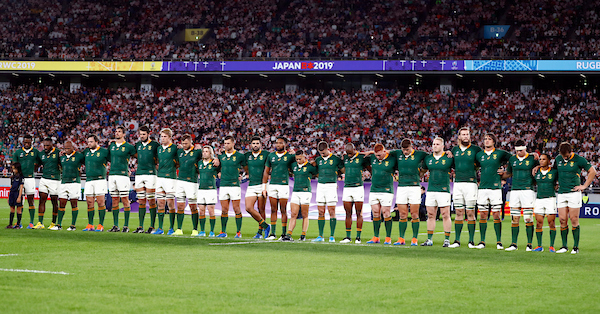It’s been more than 18 months since the Springboks last played. The world champs now face 14 Test fixtures in the space of five months. CRAIG LEWIS takes a closer look at how this could be managed.
If you’ve missed watching the Boks in action, prepare to have your green-and-gold rugby cup filled to overflowing.
On Friday, it was confirmed that the Springboks will make their return to the Rugby Championship with two home Tests before embarking on a four-match tour of Australasia.
READ: Boks’ Rugby Champs return confirmed
This follows the more imminent two warm-up matches against Georgia and then the headline three-Test series against the British & Irish Lions.
That tour ends on 7 August, and a week later the Boks head straight into their Rugby Championship return with the first battle against the Pumas.
The Springboks will enjoy a brief reprieve for a month once they’ve finished the Rugby Champs with back-to-back clashes with the All Blacks on 25 September and 2 October.
From November, the confirmed end-of-year Tests will have them then facing Wales, Scotland and England.
Domestically, bear in mind that there are still three rounds of the Rainbow Cup SA to go, a mid-year Currie Cup competition and then South Africa’s four leading franchises are set to head into the expanded PRO16.
Take a breath, because that’s a lot of rugby.
If it was thought previously that the rugby calendar was far too jam-packed, and that something had to give, this year’s ‘make up for lost time’ schedule takes matters to a whole different level.
The Covid-19 climate also means that mental welfare must be considered just as much as physical well-being.
The Springboks are set to spend six weeks in camp prior to the Lions series, which will include a strict bio-bubble environment for the entirety of the tour.
A quarantine period upon arrival in Australia at the end of August is also a given before spending several more weeks away from home while on international duty.
Further, it remains to be seen how club-vs-country negotiations will possibly progress for matches that fall outside the traditional international window.
It’s a lot to process, but it is no surprise to hear that Springbok management is already planning to allow for players’ wives and girlfriends to be part of the Bok bubble – something that was hailed as a defining feature of the ‘family-first culture’ created during the 2019 World Cup.
There’s also no way this congested international schedule will allow for the Springboks to field a full-strength team in every game, and so there is to be a certain repeat of the split-squad system that the national coaches used in the lead-up to the 2019 global showpiece.
Back then, it will be recalled that the Boks started the Rugby Championship with a so-called ‘B squad’ – although the players hated this reference so much that it was said to have provided extra motivation as they pummelled Australia 35-17 on 20 July.
At the same time, a different group of players had already settled in New Zealand, focusing all their attention on a crucial rematch against the All Blacks in Wellington.
The Boks also mixed and matched for the final two 2019 Rugby Championship clashes with Argentina, which took place on successive weekends in Salta and Pretoria.
So, there is no doubt that a revised ‘2021 balancing act’ will once again come into effect as the Springboks look to manage workload, travel and certain fixture prioritisation, all while also ensuring the team can be successful in each contest.
With all this in mind, it would particularly be manna from rugby heaven if the Boks could seal the Lions series 2-0 early on, allowing for a bit more flexibility in terms of selection for the final tour match.
Meanwhile, on the domestic scene, we haven’t even scraped the surface of unpacking just how franchises are going to cope with their fixture schedules, especially for teams losing a number of players to Springbok duty.
It’s surely why we have seen the Bulls, for example, reigniting increased collaboration on the club rugby scene in order to ensure this could be another avenue of player resources.
With franchises operating on a R60-million annual budget for no more than 45 contracted professional players, there is certainly going to be another player-management challenge of its own to ensure they can successfully contend with the Rainbow Cup, Currie Cup and PRO16 ambitions and obligations.
Ultimately, it goes without saying that there is going to be a ton of logistical work required behind the scenes to ensure all these best-laid plans don’t implode after this sudden explosion of non-stop rugby.
Good luck to all involved, it’s going to be needed!
ALSO READ: What’s in our latest issue?
Photo: Steve Haag





